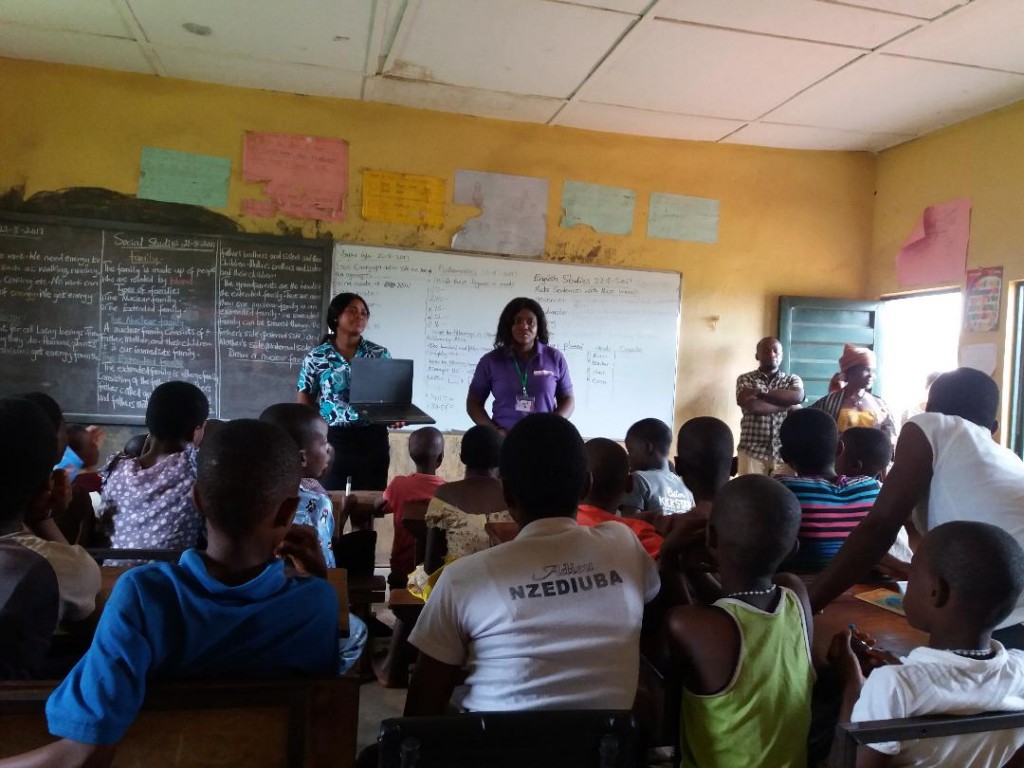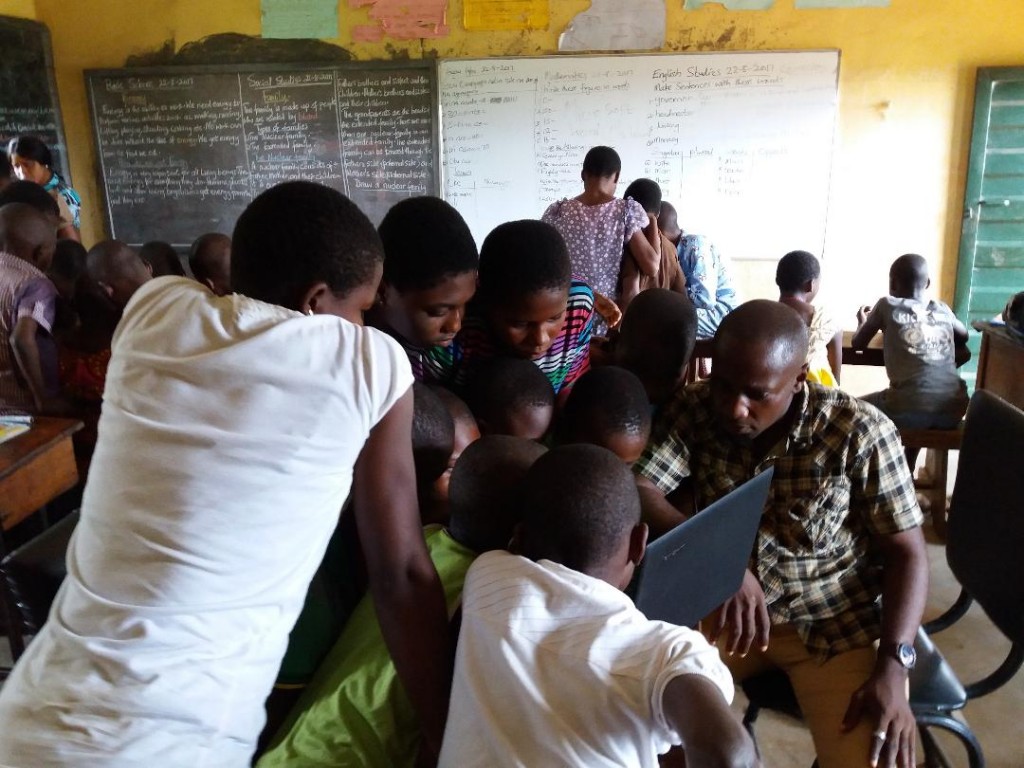Teaching Digital Skills in Rural Nigeria
Loving the Rural Community Children with Open Spaces for ICT in Nigeria: Prospects and Challenges
The incorporation of Information & Communication Technology (ICT) to enhance children’s rights is an important factor in making children feel loved and wanted in the society. The idea with our program, “Loving the rural community children with open spaces for ICT in Nigeria,” was to stimulate creation through the use of ICT learning and information resources, creating spaces for children related to their developmental processes. Children in rural communities should also be part of the populace that enjoys the social services of the digital world. There are children and young adults in the rural communities of Nigeria who want to access the world outside their villages and manipulate ICTs just like their peers in big cities and towns.
These children desire the opportunities to grow and acquire digital literacy skills that will allow them to participate in the information society.
This is the crux of United Nations (2019) Human Rights convention on the rights of children to receive and impart information and ideas of all kinds, regardless of frontiers, either orally, in writing or in print, in the form of art, or through any other media of the child's choice.
There have been several literacy and ICT practices in rural communities in Nigeria, but the community of Nawgu in Dunukofia local government area of Anambra State in South East Nigeria has never benefitted. This is a small community with mostly women and children, because the men are mainly in the city working to provide for their families. The library’s collaboration with a non-government organization (NGO) (Justice Development and Peace Commission, Onitsha) on community engagement and information from 2013, revealed that the community had low levels of literacy. Now with the UN’s establishment of Sustainable Development Goals (SDGs) in 2015, the idea of leaving no one behind became practical, and ICT opportunities were extended to children of this community to experience inclusion and participation. After all, these children are bona fide members of society and should have the same rights as other children in big towns and cities. Why should they not be served with any form of literacy? Is coming from a rural community a bad sentence for innocent and helpless children? Why does it have to be difficult to create spaces for rural children on ICTs? Thus, the resolve and mind-set were made to step out and take action for everyone’ needs in regard to 21st century learning opportunities with ICTs–even rural children (IFLA, 2018).

Children listening in computer class in rural Nigeria
It takes determination and strong will to make things happen. The coordination and planning of our program in this rural community began with planning meetings and the establishment of a work plan in March 2017 at the information center of Justice Development and Peace Commission (JDPC) Onitsha. The Librarian of Justice Development and Peace Commission (JDPC) Onitsha information Center, together with the support of eight Project Officers of JDPC, and Idikacho Women in Governance (I-WIG) agreed to take ICTs to children in the rural community of Nawgu by:
- Creating spaces and opportunities for community children to practice with ICTs
- Volunteering laptops
- Providing Internet data
- Providing tools for gaming
- Providing funds for a generator and fuel
- Providing human and technical resources to create an impact with the rural children in Nawgu community.
Advocacy was carried out to the Traditional Ruler of the Nawgu Community, His Royal Highness (HRH) Igwe Sir Geoarge Onwuogu (Igwe Ora Chili), the community stakeholders and the women’s group who happily agreed to participate in this rare opportunity. The community school was freely offered for this activity around the community with town criers and indigenous announcements using a gong to create community-wide awareness for this golden opportunity. It was also announced in the churches.
Thus, in August 2017, the ICT learning opportunities started at Nawgu community school. It was a four-week program organized three times a week from 9am to 1pm. The idea was to allow children to help their parents at home on their farms during the remaining days because it was a school holiday.
It also helped the Coordinator and her team to attend to their work in the city and prepare these enriching lessons. By scheduling the program during the long vacation in Nigeria, rural children were able to have time and space to experience the joy of using ICTs. One hundred and fifty (150) children participated in the program. Eight laptops and one projector were used. However, fiftyseven (57) students who were already in secondary schools were used for close group learning with ICT while the projector was used for general facilitation and fun with literacy-related activities.
The children were grouped in clusters of seven with project officers and the librarian facilitating the ICT digital learning. The learning started with basics in ICT because it was discovered that many of the children had neither seen nor touched computers previously, although they had seen pictures of computers on books and television. They knew about mobile phones because almost every adult has a mobile phone–even in the rural communities. Thus, the use and parts of computers were interestingly and excitedly learnt.
The first day of digital opportunities with rural community children started with display of the laptops, descriptions of computers and the various types of ICTs used in learning and transmitting information. The importance of ICTs was also taught to the children. Then, every child was given the opportunity to touch the computer, type his/her name, school, age, and community. This thrilled the children so much as their names were highlighted and designed in graphics creating the desire to type and learn more.

Children practicing in groups
The projector was also used when the groups came together in the school hall. With the aid of the generator and internet data, the children’s horizons were expanded with images, graphics, audio, visual and simple designs in creating media resources. Educational movies were shown with questions and answers on ICTs, uses and advantages. Other literacy activities were incorporated in the ICT practices. There were interactive sessions after each lesson, which helped in evaluating the program. Questions and answers were indicated a successful output: children in this rural community were highly engaged. A closing ceremony was organized at the end of the ICT practices program in the community school compound, which attracted the parents, guardians and other community members. Students were given prices of customized books and learning aids to motivate them to reach new heights.
Interestingly, great lessons were learnt from the activity. These include the enthusiasm willingness and ease with which the community children learnt with ICT. They loved working and navigating with computer just as much as privileged children in the city. They were also creative and smart when they were allowed to apply their designs in their assignment. They showed great intelligence on questions and answers related to ICTs and the joy they expressed at the end made the Traditional Ruler and the parents start dialogues about providing more learning exposure for their children.
However, while our program was a rewarding venture, challenges obstructed some structured activities during the ICT practices in the community. It was painfully noted that it would have been lovely to have provided every child with computer or ICT gadget for the program to provide for easy and speedy learning. The distance from the city to Nawgu community did not allow for very comfortable movement which affected some operations of the ICT practices. Again, because it was a free program, it took regular negotiation with the community volunteers and participants to persevere and complete the project as agreed on without remuneration.
Excitedly, the prospects for the community children’s ICT practices in Nawgu in Anambra State, Nigeria attracted supports and opened avenues for more literacy spaces. The Anambra State Library Board collaborated with another NGO to create a literacy program in Nawgu community during the long vacation of 2018. Anambra State Library Board also integrated the community school in its itinerary of school beneficiaries that receive book donations and other learning aids on regular intervals. Another ICT program is being planned for 2019 long vacation by the library and an NGO in Anambra State. The warm, sustainable relationship among the school community, stakeholders, library board, NGO and the Coordinator have paved the way for special visits to the community school, which are sometimes organized in support of the school library and incorporation of ICT classes in the curriculum.
In conclusion, ICT practices were successfully delivered to the rural community, indicating that libraries and information centers can actually extend literacy activities to special groups in underserved communities. The opportunities created for the community children in practicing ICT proved that resources can be pooled together with good coordination, collaboration and planning. Looking at the prospect of delivering service to a single community, demonstrates that taking action opens closed doors and creates invited and inclusive spaces for the improvement of quality of life. When it comes to ICTs, no one–no child, and no community should be excluded. Even rural children have the right to social services, which should be provided to them with dignity.
References
IFLA (2018). Our vision our future. Accessed on June 7 2019 from /node/36891
United Nations (2019). Convention on the Rights of the Child. Accessed on May 26, 2019 from https://www.ohchr.org/en/professionalinterest/pages/crc.aspx
Acknowledgement
Sincere appreciation goes to Justice Development and Peace Commission (JDPC) Onitsha, Idikacho Women in Governance (I-WIG), Anambra State Library Board and Traditional Ruler of Nawgu Community with his warm people. Their input added the desired output in this project.
Author:
Ngozi Perpetua Osuchukwu (Coordinator, Nawgu children learning opportunity. She was the Librarian with Justice Development and Peace Commission from 2012 to 2017)
Mail: ngostary2k@yahoo.com